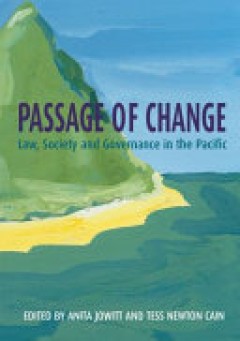Filter by

The environmental rule of law for oceans: designing legal solutions
Our oceans need a strong and effective environmental rule of law to protect them against increased pressures and demands, including climate change, pollution, fisheries, shipping and more. The environmental rule of law for oceans requires the existence of a set of rules and policies at multiple governance levels that appropriately regulate human activities at sea and ensure that pressures on th…
- Edition
- -
- ISBN/ISSN
- 9781009253741
- Collation
- xxxiii, 380 pages; illustration
- Series Title
- -
- Call Number
- 341.4 POZ t

The individual in the economic and monetary union: a study of legal accountab…
The European Union's response to the financial crisis was designed in a way that prevented EU citizens from holding decision-makers accountable. This book reimagines legal accountability by focusing on the citizen, who should be at the centre of the common interest in the EU, with solidarity and equality as guiding principles.
- Edition
- -
- ISBN/ISSN
- 9781009207942
- Collation
- xxv, 220 pages
- Series Title
- -
- Call Number
- 346.402 BOB t

International courts versus non-compliance mechanisms: comparative advantages…
The effective implementation of treaties is essential. This book examines the advantages of non-compliance mechanisms (NCMs) versus that of international courts and tribunals to support treaty fulfilment. It brings together globally-recognised names in international law, human rights law, environmental and climate change law, and trade law.
- Edition
- -
- ISBN/ISSN
- 9781009373913
- Collation
- xx, 508 pages; illustration
- Series Title
- -
- Call Number
- 341.5 VOI i

Trade policy and gender equality
With a range of interdisciplinary contributions and national and regional case studies, this collection offers a systematic, up-to-date evaluation of the debate relating to international trade law, policy, and gender equality. It analyses recent trade negotiations and agreements through a gender lens. Available as Open Access on Cambridge Core
- Edition
- -
- ISBN/ISSN
- 9781009363716
- Collation
- xxvii, 402 pages
- Series Title
- -
- Call Number
- 343.08 BAH t

Harnessing public research for innovation in the 21st century: an internation…
Universities and public research institutes play a key role in the innovation ecosystem. Many countries have implemented national strategies to support the commercialization of knowledge produced by public institutions, to help take their innovations and scientific breakthroughs to market and ultimately boost economic growth. Research bodies themselves have also introduced practices to support …
- Edition
- -
- ISBN/ISSN
- 9781108842792
- Collation
- 544 p
- Series Title
- Intellectual property, innovation and economic development
- Call Number
- 607.2 ARU h

States-in-waiting: a counter narrative of global decolonization
States-in-Waiting narrates how postcolonial statehood did not fulfill the aspirations of many nationalist claimants demanding independence. Foregrounding little-known regions and the networks connecting them to global politics, Lydia Walker illuminates the un-endings of decolonization. This title is also available as Open Access on Cambridge Core
- Edition
- -
- ISBN/ISSN
- 9781009305815
- Collation
- xvi, 283 pages; illustration
- Series Title
- Global and international history
- Call Number
- 320.9 WAL s

Transforming food systems under climate change through innovation
Our food systems have performed well in the past, but they are failing us in the face of climate change and other challenges. This book tells the story of why food system transformation is needed, how it can be achieved, and how research can be a catalyst for change. Written by a global interdisciplinary team of researchers, it brings together perspectives from multiple areas including climate,…
- Edition
- -
- ISBN/ISSN
- 9781009227216
- Collation
- 254 p
- Series Title
- -
- Call Number
- 338.1 CAM t

Constitutional challenges in the algorithmic society
Technologies have always led to turning points for social development. In the past, different technologies have opened the doors towards new phase of growth and change while influencing social values and principles. Algorithmic technologies fit within this framework. Although these technologies have positive effects for the entire society by increasing the capacity of individuals to exercise ri…
- Edition
- -
- ISBN/ISSN
- 9781108843126
- Collation
- x, 330 pages ; 24 cm
- Series Title
- -
- Call Number
- 342 MIC c

Cultural expertise, law, and rights: a comprehensive guide
Cultural Expertise, Law and Rights introduces readers to the theory and practice of cultural expertise in the resolution of conflicts and the claim of rights in diverse societies. Combining theory and case-studies of the use of cultural expertise in real situations, and in a great variety of fields, this is the first book to offer a comprehensive examination of the field of cultural expertise: …
- Edition
- 1
- ISBN/ISSN
- 9781003167075
- Collation
- xiv, 360 pages; illustration
- Series Title
- -
- Call Number
- 340.115 HOL c

Passage of change : law, society, and governance in the Pacific
Numerous issues face Pacific states trying to find their way in the early 21st century. Countries are striving to secure the benefits of modernisation. Governance, law and order are needed to reach such a goal, but development cannot be at the price of culture or the environment. The question of how to develop and maintain sound legal systems and legal rules whilst maintaining the unique cultur…
- Edition
- -
- ISBN/ISSN
- 9781921666889
- Collation
- -
- Series Title
- -
- Call Number
- 340.5295 JOW p
 Computer Science, Information & General Works
Computer Science, Information & General Works  Philosophy & Psychology
Philosophy & Psychology  Religion
Religion  Social Sciences
Social Sciences  Language
Language  Pure Science
Pure Science  Applied Sciences
Applied Sciences  Art & Recreation
Art & Recreation  Literature
Literature  History & Geography
History & Geography